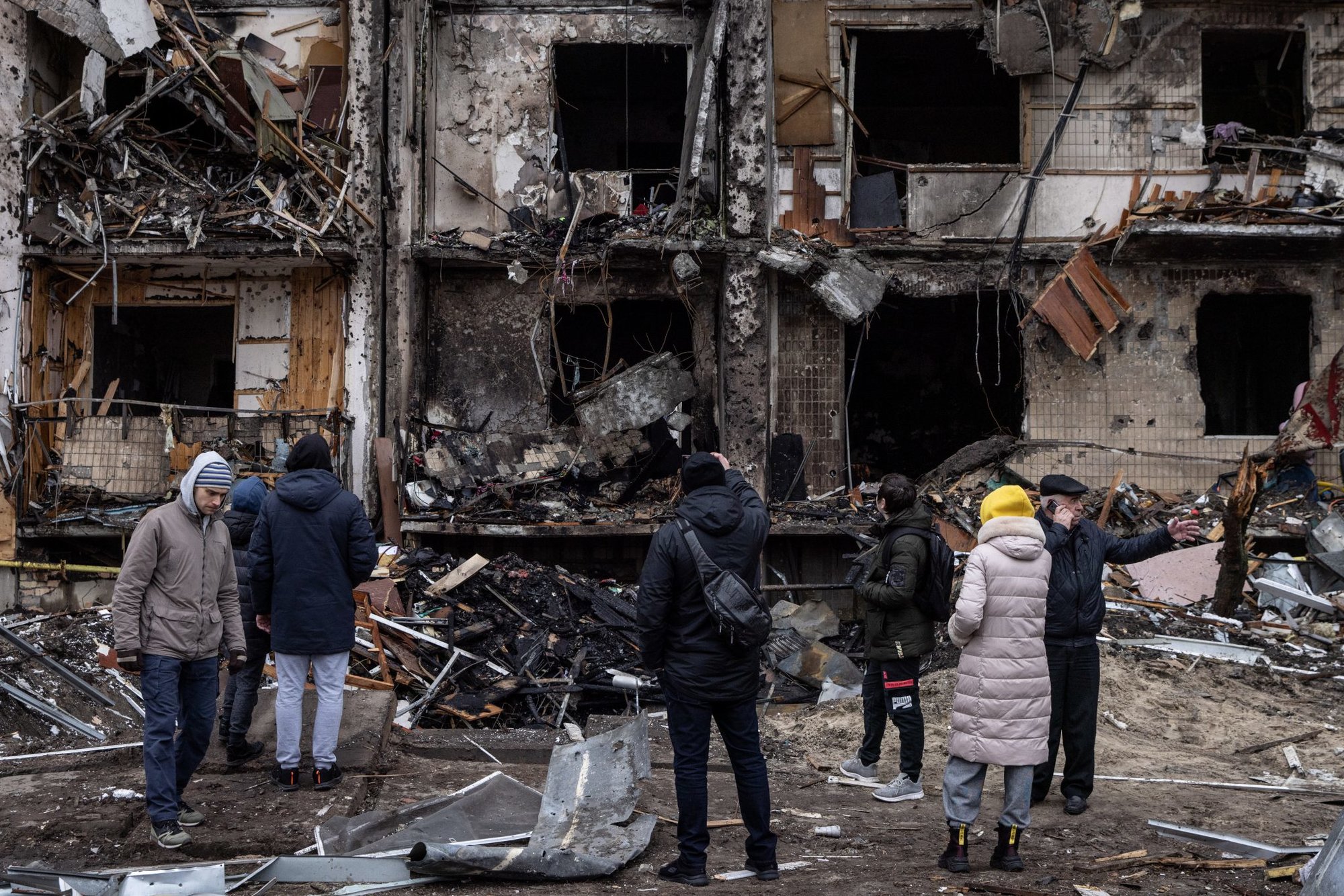
People look at the exterior of a damaged residential block hit by an early morning missile strike Friday, Feb. 25, 2022, in Kyiv, Ukraine. On Thursday, Feb. 24, 2022, Russia began a large-scale attack on Ukraine, with Russian troops invading the country from the north, east, and south, accompanied by airstrikes and shelling. The Ukrainian president said that at least 137 Ukrainian soldiers were killed by the end of the first day. Photo by Chris McGrath via Getty Images.
2 May 2022 | Kyiv, Ukraine
At first it looked like Kyiv would fall.
On the morning of Feb. 25, 2022, the second day of the full-scale war, a unit of Russian soldiers advanced within the city limits. A gun battle erupted on the streets of the Obolon neighborhood, within earshot of my downtown apartment. Amid the rattle of small-arms fire, my cat, Luna, abandoned my lap and sought safety under the sofa. When the air raid sirens began to wail a moment later, I surrendered my coffee, dropped to my hands and knees, and dragged Luna’s tiny, trembling body into my arms. I whispered to her, “It’s okay, it’s okay, it’s okay…” as I hurried to a nearby metro station and joined the huddled hundreds sheltering inside from Russia’s missiles.
Down in the belly of the underground hall, I found an empty corner for Luna and me. Seated in my arms and still shaking, my little black cat hid her face in the crook of my elbow and stayed silent. Some children around us laughed and played, while most adults sat stone-faced and spoke softly. Every so often, I caught someone’s look and saw something familiar in the unfamiliar eyes. In that instant, we shared more than strangers often do. Caught in the tide of an accelerating calamity, we hurtled together toward an unknown end and wondered, “Will Kyiv fall?”
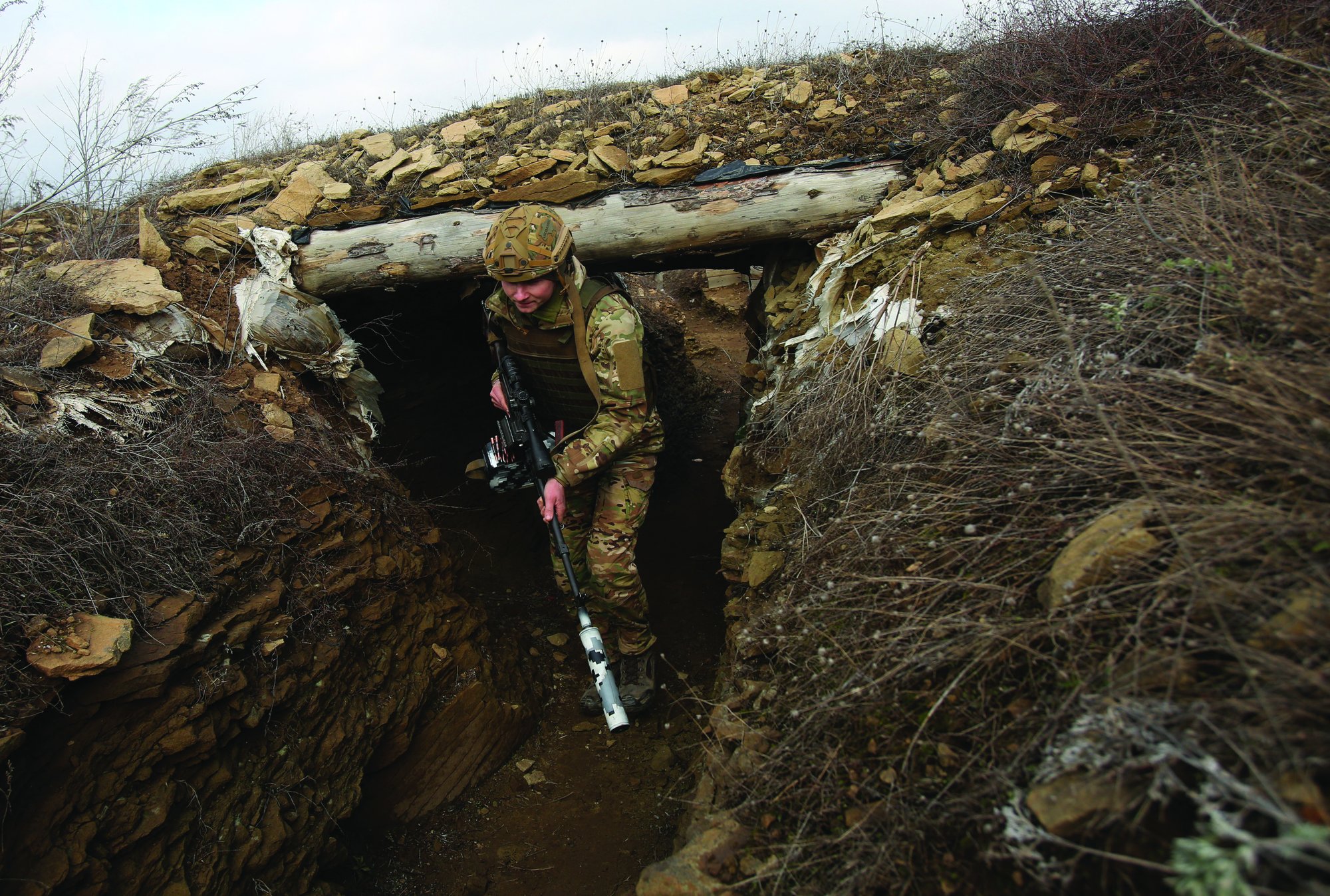
A Ukrainian serviceman walks along a trench on the front line with Russia-backed separatists in the Luhansk region of Ukraine on Feb. 22, 2022, two days before Russia launched a full-scale invasion. Photo by Anatolii Stepanov/AFP/Getty Images.
At that point, Moscow certainly seemed to think so. Some advancing Russian units carried parade uniforms, revealing preparations for a triumphant victory march. Even the US government demonstrated little faith in Kyiv’s ability to hold out for more than a few days.
Two months later, I type these words in a free and unoccupied Kyiv because Ukraine’s soldiers, civilians, and political leaders held their ground, turned the tide of battle, and saved their capital city.
In the early hours of Feb. 24, Russian President Vladimir Putin declared his “special operation,” and missile strikes thundered across Ukraine. Russian troops gained ground, and the sounds of approaching explosions violated Kyiv’s ordinary urban din. The occasional crackle of small-arms fire was audible, too, as Russian special operations troops forced their way downtown in a bid to kidnap or kill Ukrainian President Volodymyr Zelenskyy. During those frightful first days, the roads out of Kyiv clogged with traffic as many tried to flee. At the city’s main train station, women offered their babies to strangers on overloaded trains.
At night, Ukrainian surface-to-air missiles and anti-aircraft tracers split the sky, seeking inbound Russian missiles. You heard the chilling snarl of jet noise overhead and wondered, Russian or Ukrainian? When the air raid sirens sounded, as they often did, you debated whether to seek shelter or simply shut yourself inside the bathroom with your body armor vest draped over you like a child’s protective blanket.
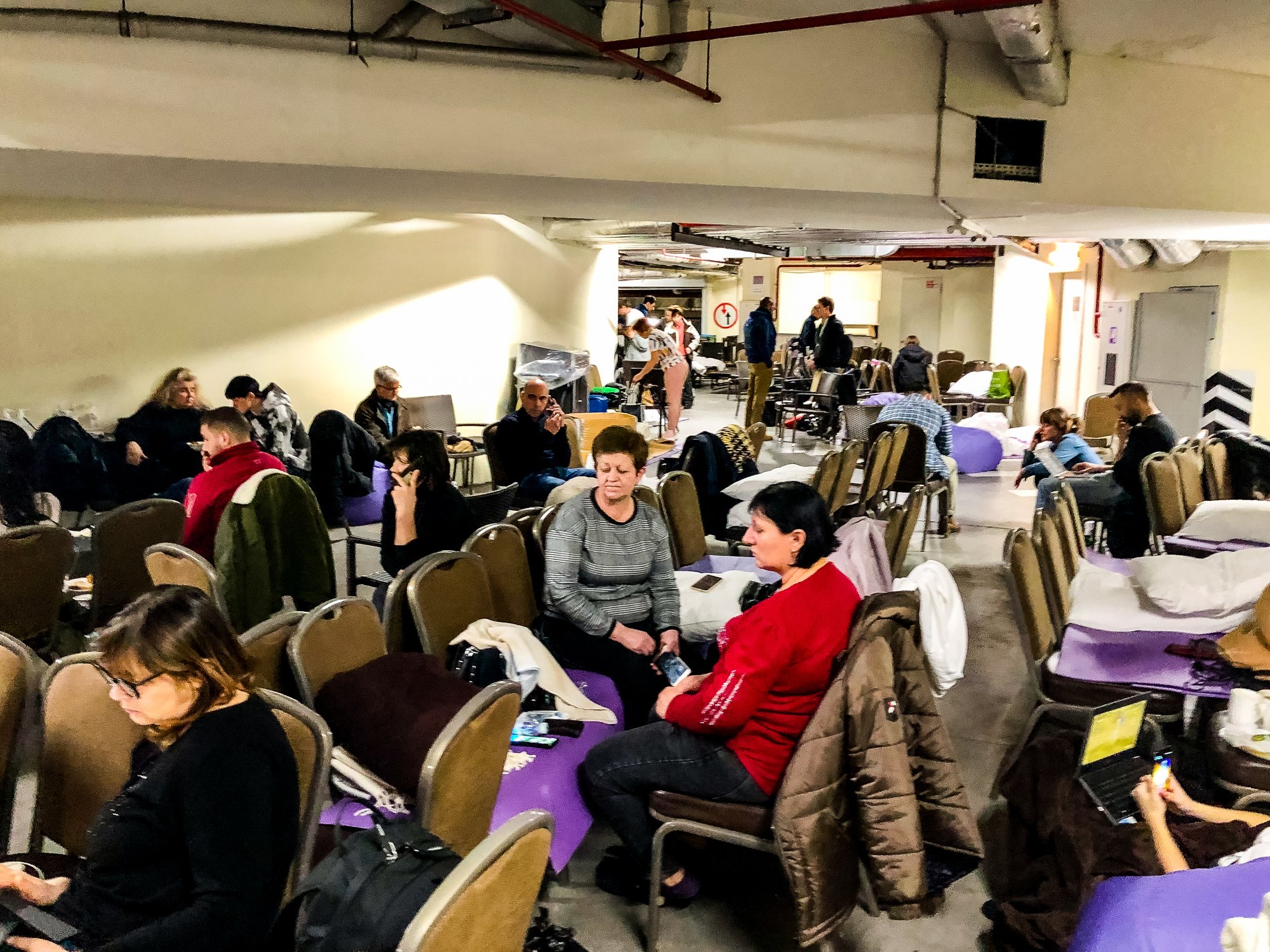
Inside a Kyiv shelter during an air raid alert on Feb. 26, 2022. Photo by Nolan Peterson/Coffee or Die Magazine.
Kyiv’s citizens quickly adapted to the danger. Down in the bomb shelters, you’d see snapshots of their resilience. Smiles and laughter. Children playing. Every so often, the Ukrainian national anthem sounded from someone’s smartphone. So, too, did the voice of Zelenskyy, who declared in an online video on Feb. 26, the third day of the full-scale war, that he was still in Kyiv and would not leave.
“I need ammunition, not a ride,” Zelenskyy famously said, refusing American entreaties to evacuate.
Zelenskyy’s defiance inspired Kyiv’s soldiers and citizens to dig in and do whatever was necessary to save their city. Even so, the weeks that followed tested the city’s soul.
Russian missiles repeatedly struck residential areas, killing scores of civilians. We learned to live with the terrible truth that there was no safe quarter within the city. Death could arrive at any moment, at any place. Quarantined from the war being waged in the eastern Donbas region for eight years, our city was now smack in the middle of a Russian blitzkrieg. The store shelves slowly thinned as supply lines strained. Each day, people waited in long lines outside grocery stores and pharmacies. Territorial defense troops on the streets were edgy and on guard for saboteurs and spies. If they deemed you suspicious looking, they’d approach with guns drawn and twitching trigger fingers while they inspected your documents.
After two weeks at war, 2 million people were left living in the city, about half the number as before the full-scale invasion. By then, an eerie quiet had descended over Kyiv’s once bustling downtown streets. Restaurants, bars, and nonessential stores remained closed. Town Hall banned the sale of alcohol and established a nightly curfew. Plywood planks and crisscrossed duct tape covered streetside windows. Stacked concrete slabs barred the way to some sidewalk entrances. Anti-tank hedgehogs and barbed wire interrupted the streets. At night, the window-rattling booms of Russian missile impacts often jolted us awake.
Each day, it seemed like things edged closer to falling apart. But they never did. The Ukrainian military marked incremental victories, stayed the Russian advance, and reversed the sense of impending doom.
Ukraine’s capital city was never encircled or truly besieged. The southern roads remained open and traffic flowed. Despite the constant missile strikes and combat on the outskirts, these open roads allowed goods and supplies to flow into the city.
Kyiv’s residents found ways to deal with this wartime rhythm of life and carry on. After all, dogs still needed to be walked, and the trash still had to be taken out. It was a twilight zone reality in which a street you’d walked on 10,000 times before became totally foreign, and the performance of an ordinary habit became an act of resistance. Aliona Guseva, a 28-year-old public relations professional, did yoga every morning in her downtown Kyiv apartment as a way to stay calm. Maintaining such little habits allowed her to remember life before the war.
"Kyiv’s residents found ways to deal with this wartime rhythm of life and carry on."
“We will learn to live in war whether we like it or not,” Guseva told me. “We must learn to live with new realities. […] Everything is temporary, both good and bad.”
At an overlook beside the Dnipro River at sunset one evening in mid-March, I observed a crowd of people standing together and silently staring toward the sounds of shelling. The daylight faded, and the horizon glowed red from the inferno of battle. Among the gathered onlookers that evening was a 24-year-old information technology specialist named Denys.
“I was scared at the beginning of the war, but now I have to live,” he told me.
I asked if the war still scared him.
“I can’t sleep if it’s quiet,” he said. “The sounds of war help me to sleep.”
The work of defending their hometown infused many of Kyiv’s residents with personal purpose and meaning, feelings that had eluded them in peacetime.
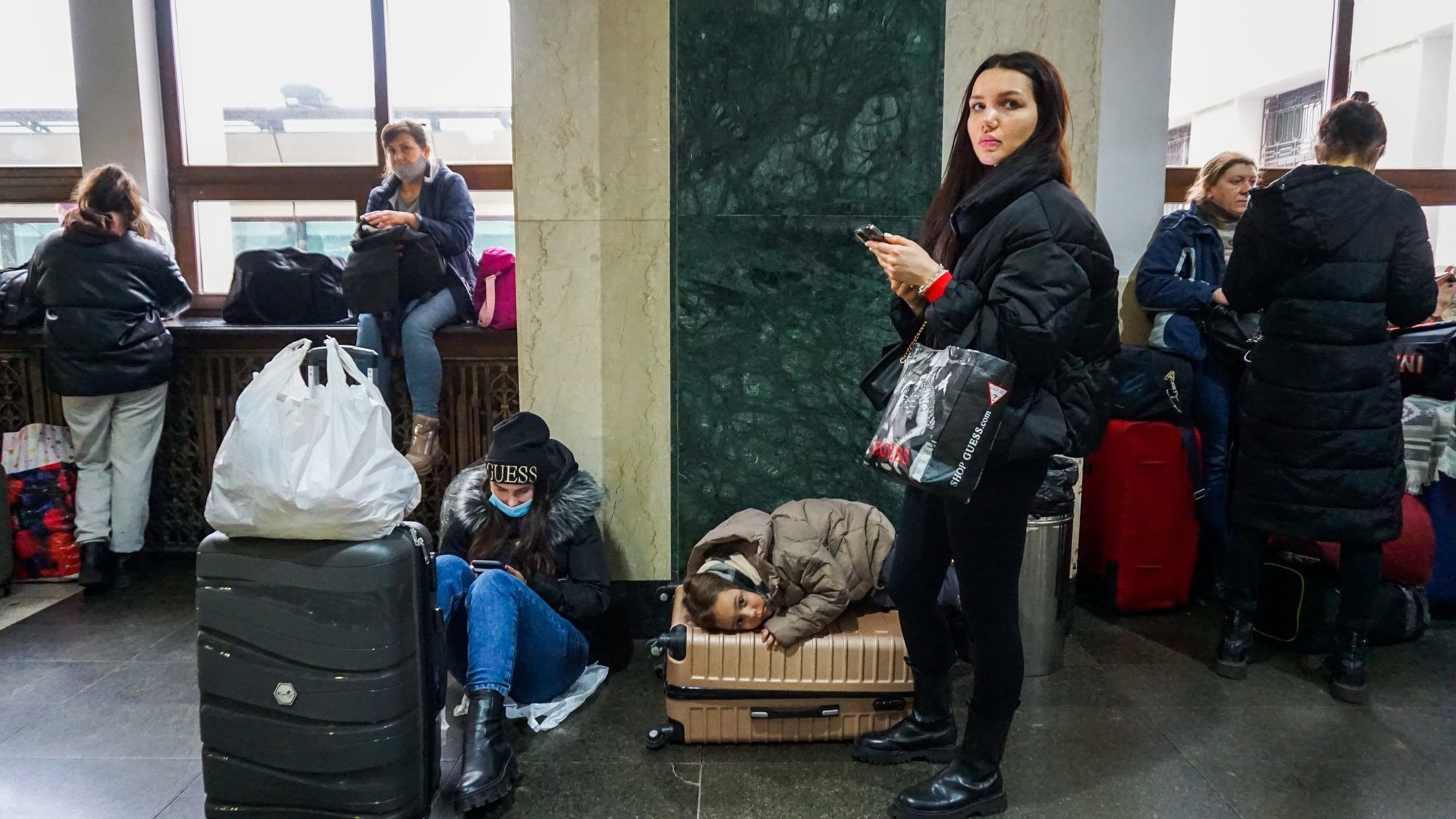
Kyiv civilians flee the city as Russian bombing nears on Feb. 24, 2022. Photo by Nolan Peterson/Coffee or Die Magazine.
At the height of the Battle of Kyiv, I spent a day driving around the city with Sergiy Levchuk, president of the Ukrainian Karate Federation, while he delivered body armor and other gear to military units.
“I’m not depressed at all,” Levchuk told me. “Actually, I’m happier than ever. I feel useful, and I know what I’m doing is one small part of winning the war.”
On March 28, Ukrainian forces retook the satellite city of Irpin from Russian forces. To Kyiv’s east, Ukrainian forces gained steady ground. On March 29, Russia vowed to “drastically reduce” its military activity near Kyiv.
Around this time, I went for a walk along the Dnipro River and observed a gray-haired woman sitting on a bench with her lined, smiling face pointed toward the springtime sun. Curious, I introduced myself and asked the woman, whose name was Liudmyla, how she felt now that Ukraine had won the Battle of Kyiv. Without dropping her sun-facing smile, Liudmyla told me, “I’m very proud of my country. We’ve been fighting for our freedom for more than a century, and I believe we will finally win it.”
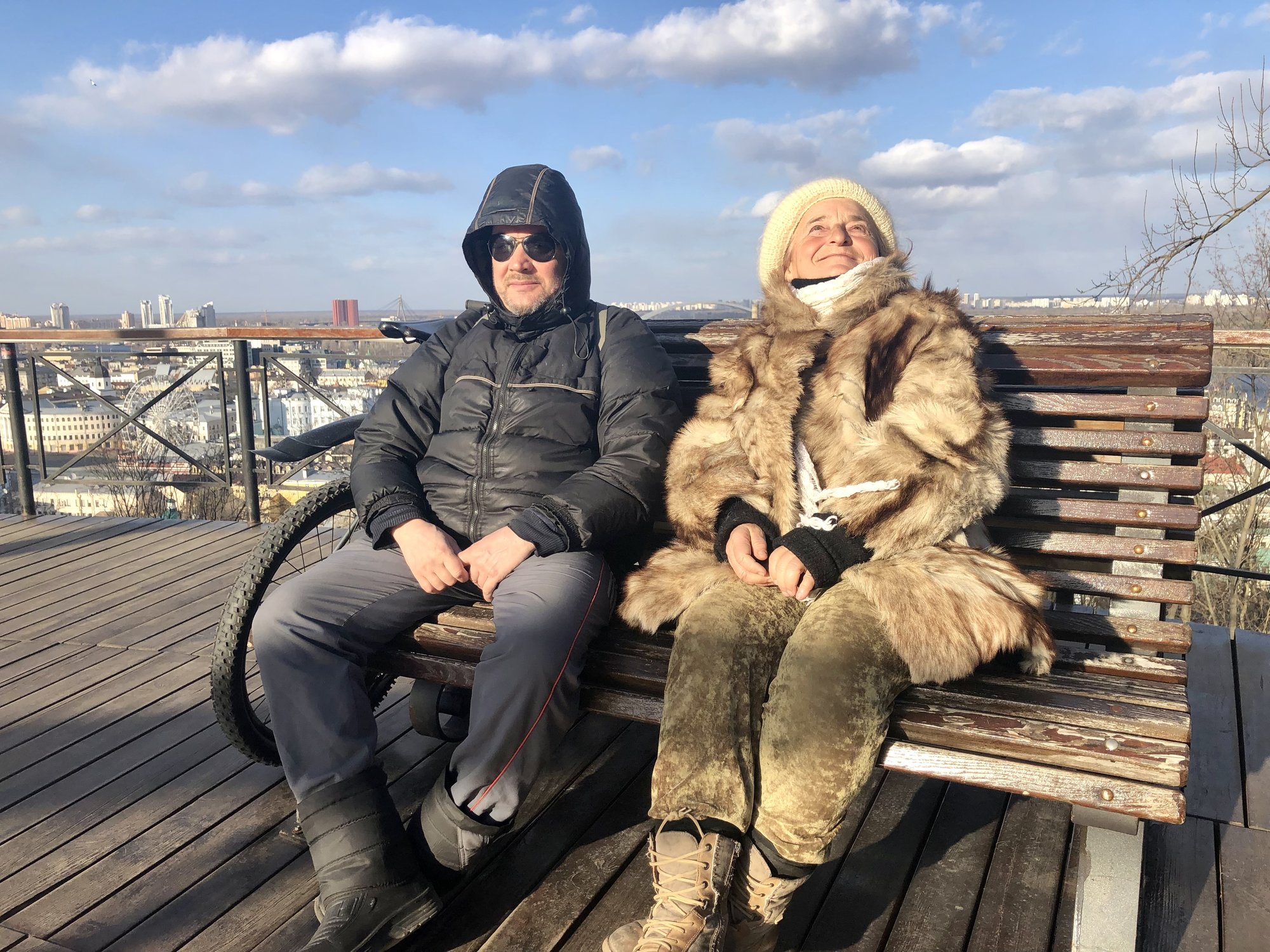
Yevheniy and Liudmyla at an overlook in central Kyiv on March 27, 2022. Photo by Nolan Peterson/Coffee or Die Magazine.
By April 1, the 37th day of the full-scale war, Russian forces had fully retreated from Kyiv’s outskirts. That day I felt like an astronaut playfully bounding across the surface of the moon, unburdened by the gravity I’d gotten used to. The long pauses between the receding explosions allowed me to enjoy sounds I hadn’t noticed in weeks. Birds chirping. A breeze rustling the leaves of a tree. The sounds had been there all along; I’d just forgotten to notice them.
As I type these words, Luna naps serenely on my lap and Kyiv remains squarely under Ukrainian control. Many of the city’s bars and restaurants are open, gyms are back in business, schools are operating online, even Uber is operational. The missile threat persists, but most people shrug off the air raid alerts these days and go about their business — albeit with a cautious glance toward the sky, just in case.
Bit by bit, life is returning to normal. Kyiv’s outskirts, meanwhile, remain a war-ravaged wasteland. Testifying to Moscow’s military hubris, burnt and blasted Russian tanks blight the roads and fields. The mass graves in places like Bucha and Irpin warn of the Kremlin’s dark and unfinished ambitions.
The war isn’t over, but its opening battle has ended. Years from now, the Battle of Kyiv will be a historical trope on par with other great turning points in history, such as the Miracle of the Marne, the Battle of Britain, or the Battle of Moscow. The Battle of Kyiv was the turning point in this young war and this young century. Everything that happens next will happen because Kyiv did not fall.
This article first appeared in the Summer 2022 print edition of The Forward Observer, a special edition of Coffee or Die Magazine.
Read Next: DISPATCH: Ukrainian Civilians Train To Resist a Russian Invasion

BRCC and Bad Moon Print Press team up for an exclusive, limited-edition T-shirt design!
BRCC partners with Team Room Design for an exclusive T-shirt release!
Thirty Seconds Out has partnered with BRCC for an exclusive shirt design invoking the God of Winter.
Lucas O'Hara of Grizzly Forge has teamed up with BRCC for a badass, exclusive Shirt Club T-shirt design featuring his most popular knife and tiomahawk.
Coffee or Die sits down with one of the graphic designers behind Black Rifle Coffee's signature look and vibe.
Biden will award the Medal of Honor to a Vietnam War Army helicopter pilot who risked his life to save a reconnaissance team from almost certain death.
Ever wonder how much Jack Mandaville would f*ck sh*t up if he went back in time? The American Revolution didn't even see him coming.
A nearly 200-year-old West Point time capsule that at first appeared to yield little more than dust contains hidden treasure, the US Military Academy said.












